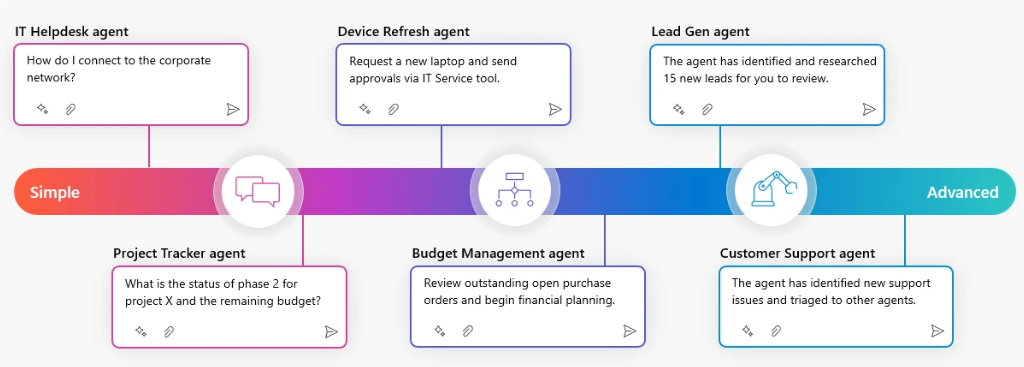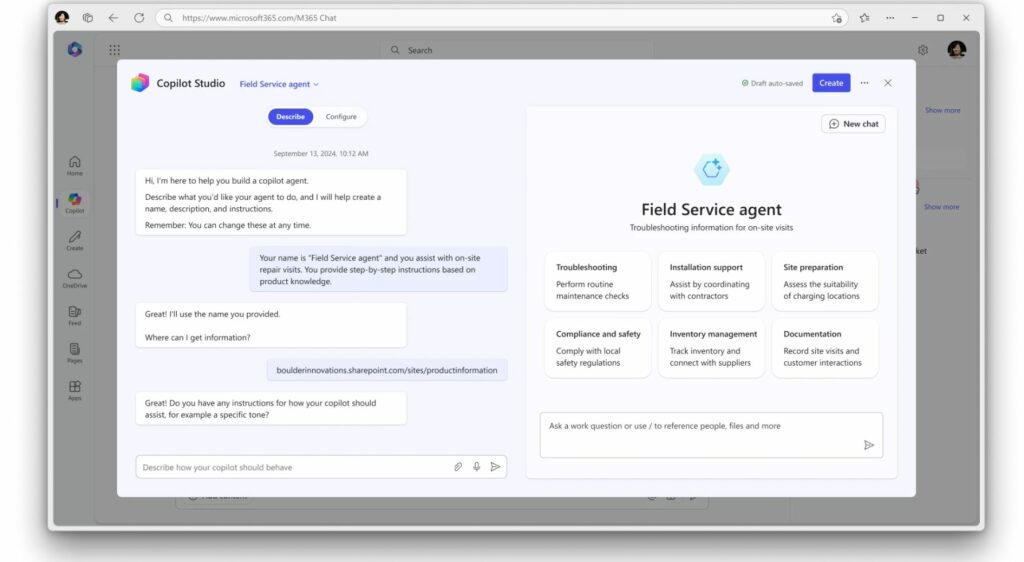Autonomous Agents in Copilot Studio
Autonomous Agents in Copilot Studio
November 11th, 2024
5 min read
For a modern business efficiency and adaptability are crucial, which is why Microsoft’s Copilot Studio has introduced an innovative feature: Autonomous Agents. These advanced AI-powered agents go beyond basic task automation, offering a new level of operational flexibility and intelligence for businesses. In this article, we’ll explore what Autonomous Agents are, how they work within Copilot Studio, and the transformative potential they bring to organisations across various sectors.
What Are Autonomous Agents in Copilot Studio?
Autonomous Agents in Copilot Studio represent a significant leap in AI technology. Unlike traditional AI models that require specific instructions to complete tasks, Autonomous Agents can independently interpret and carry out objectives. This ability to “self-direct” within defined parameters makes them a powerful addition for businesses looking to scale operations, improve productivity, and reduce manual workload.
In practical terms, Autonomous Agents can perform multi-step processes, handle complex customer interactions, and continuously learn from new data without requiring constant human oversight. They are designed to assist with a wide range of tasks across sectors, from customer service to internal process automation, offering an adaptable solution that can be tailored to the unique needs of each business.
How Do Autonomous Agents Work in Copilot Studio?
Autonomous Agents in Copilot Studio operate through a combination of AI, machine learning, and natural language processing. Here’s how they work:
- Learning and Adaptation
Autonomous Agents can be trained to understand and adapt to specific workflows, using data to refine their responses and improve their efficiency. This adaptability allows them to offer more accurate and effective support over time, making them ideal for repetitive, time-consuming tasks where consistency and accuracy are essential.
- Task-Oriented Autonomy
These agents are designed to function independently within set boundaries, freeing teams from micro-managing AI processes. For example, in a customer service setting, an Autonomous Agent can handle queries, escalate issues when necessary, and provide personalised responses based on prior interactions—all without manual intervention. This level of autonomy helps streamline operations and increase productivity.
- Real-Time Decision-Making
Autonomous Agents are equipped to make decisions in real-time, using pre-defined rules and data inputs. This capability makes them well-suited for roles where quick decision-making is essential. For instance, responding to customer inquiries, flagging high-priority issues, or adjusting operations based on new data insights.

Business Benefits of Autonomous Agents
Introducing Autonomous Agents to your organisation can offer numerous benefits, especially when it comes to operational efficiency, customer satisfaction, and cost savings.
- Enhanced Productivity: Autonomous Agents free up human resources by handling routine or complex tasks independently. This allows employees to focus on more strategic, high-value work, enhancing overall productivity.
- Scalable Support: For customer-facing roles, Autonomous Agents provide around-the-clock assistance without the need for a human representative. This capability is invaluable for organisations looking to offer high-quality service at any time, accommodating customer needs in different time zones or during peak periods.
- Cost Reduction: By reducing the need for manual work, Autonomous Agents can help cut operational costs. Automating routine processes means fewer resources are needed to achieve the same results, ultimately improving the bottom line.
- Data-Driven Insights: Autonomous Agents provide valuable insights by analysing interactions and identifying trends in customer behaviour or internal workflows. This data can inform business strategies, helping organisations make more informed decisions.
Use Cases: Autonomous Agents in Action
To illustrate the potential of Autonomous Agents, here are a few examples of how businesses might implement them across industries:
Customer Service
Autonomous Agents can handle customer inquiries, follow-ups, and common issues, seamlessly escalating complex cases to human agents. This ensures quick, high-quality support, enhancing customer satisfaction.
Sales
In sales, Autonomous Agents could be used to qualify leads, manage follow-ups, and provide instant product information. They streamline the sales cycle, helping teams engage prospects efficiently and boost conversions.
Marketing
For marketing you can use Autonomous Agents to manage cross-channel interactions, respond on social media, and personalise messaging. This targeted engagement strengthens customer relationships and ensures brand consistency.
Field Operations
In field ops, Autonomous Agents can assist with dispatch management, real-time updates, and troubleshooting for on-site staff. They provide instant support, flag urgent issues, and help keep field operations running smoothly.

Partnering with Pragmatiq for Autonomous Agent Implementation
As a certified Microsoft Partner, we can guide your organisation through implementing Autonomous Agents in Copilot Studio, from initial consultation to customisation and deployment. We work closely with businesses to tailor AI agents to their specific needs, ensuring a seamless integration that aligns with their objectives. By partnering with us, you can unlock the full potential of Autonomous Agents and bring cutting-edge AI to your workflows. Get in touch today by emailing info@pragmatiq.co.uk or calling 01908 038110.
Want to keep in touch?
Sign up to our newsletter for regular updates.
"*" indicates required fields